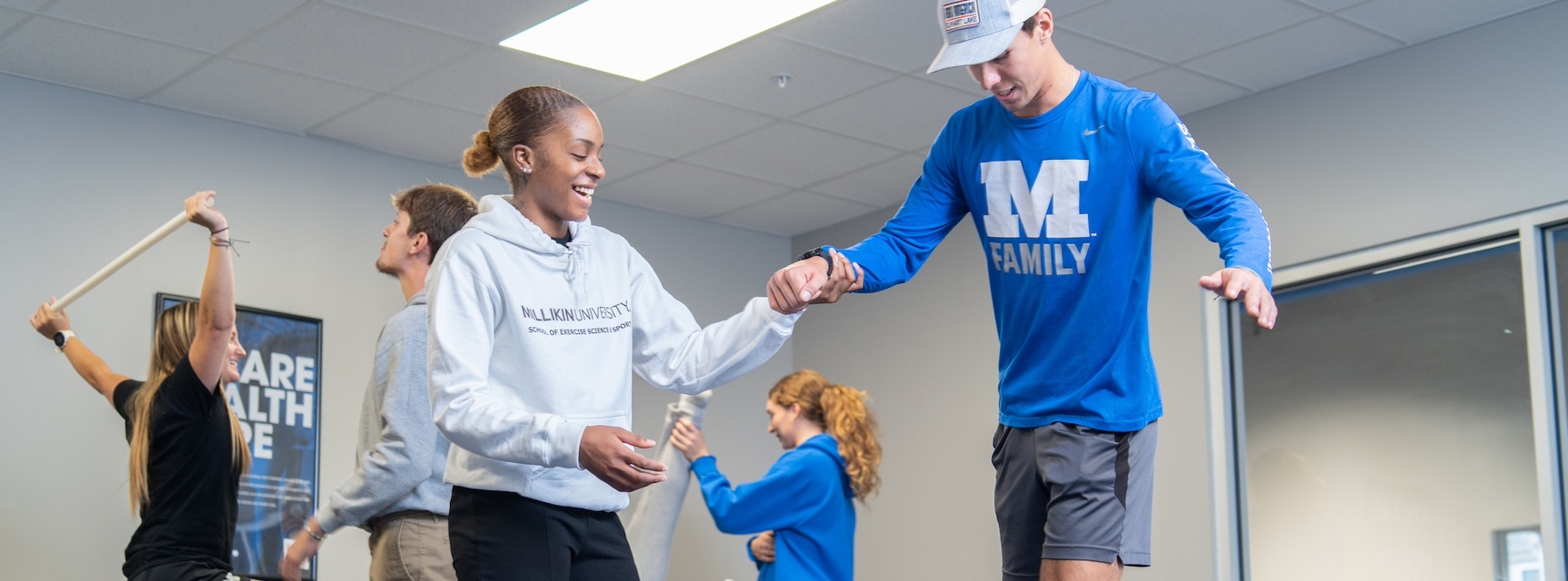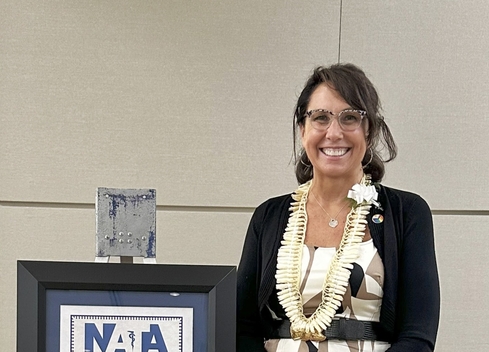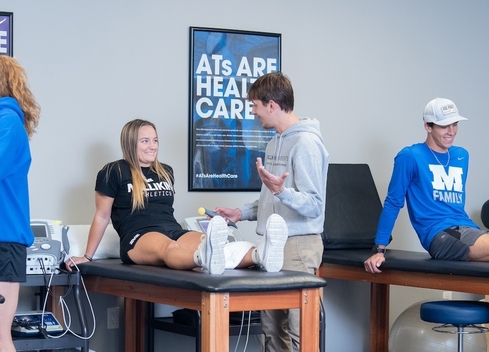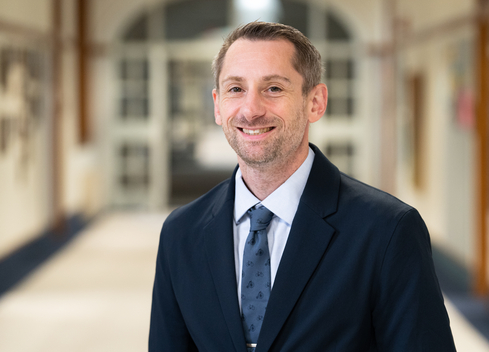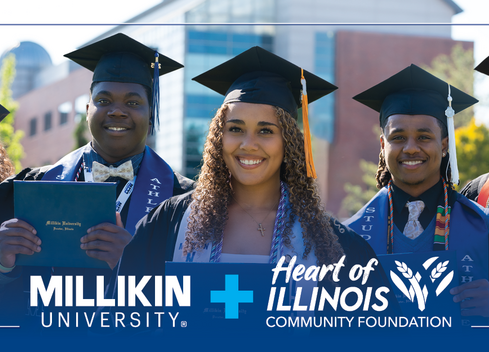ES501 Applied Clinical Anatomy (3)
This course examines the relationship of the human body and anatomical structures and systems. Special focus is given to these systems' roles in exercise performance, biomechanical skill development and injury prevention/rehabilitation. Gross anatomical identification of specific bones, landmarks, origins, insertions, actions, joint structures, nerves, vessels, and organs will be the primary focus.
ES502 Emergency Procedures in Athletic Training (3)
This course is designed to cover in-depth Basic Life Support Skills. Topics addressing prevention, recognition, and management of life-threatening and/or severe injury/illness are included. Application of skills that include environmental, CPR/AED, airway management, immobilization, bleeding control and sudden illness management are also addresses. Students will be certified in Basic Life Support.
ES503 Evidence Based Research (3)
This course introduces research methodology and data analysis related to evidence-based practice in athletic training. Topics include formulating clinical questions, appraising existing research and understanding levels of evidence. This course also introduces students to a variety of statistical measures commonly used in athletic training research.
ES504 Professional Practice in Athletic Training (3)
This course covers the roles and responsibilities of an athletic trainer as well as the history, governance structure and regulation of athletic training practices. This course will also cover introductory concepts including ethical behavior, evidence-based practice, basic evaluation skills, and documentation. Instruction and practical application of taping, wrapping, bracing techniques, and protective equipment is also included.
ES505 Athletic Training Practicum I (2)
This is the first of four laboratory courses required of MSAT students. Under the direct supervision of a board-certified athletic trainer/clinical preceptor, the students will observe and begin to participate in the organization and administration of the athletic training environment and the care given to athletes. Students will gain an understanding of the daily operations of the athletic training room and learn entry-level skills in athletic training focusing on risk management and injury prevention, acute care of injury and illness, and basic assessment and evaluation skills.
ES506 Clinical Integration I (1)
This course is designed to refine clinical decision-making skills through the practice and evaluation of specific athletic training proficiencies. Students will integrate classroom/didactic instruction into the clinical settings to progress to a greater level of practical application. Skill integration will be developed and evaluated under the direct supervision of a clinical preceptor.
ES511 Lower Extremity Evaluation (3)
This course is designed to provide students with an intensive, thorough study of orthopedic and neurovascular evaluation techniques used by sports medicine professionals to assess orthopedic and athletic related injuries to the lower back, pelvis, and lower extremities sustained by physically active individuals. Lecture, demonstration, and practical experience will be the instructional methods used to help students gain knowledge and confidence in their orthopedic and athletic injury assessment techniques.
ES512 Upper Extremity Evaluation (3)
This course is designed to provide students with an intensive, thorough study of orthopedic and neurovascular evaluation techniques used by sports medicine professionals to assess orthopedic and athletic related injuries to the spine, head, and upper extremities sustained by physically active individuals. Lecture, demonstration, and practical experience will be the instructional methods used to help students gain knowledge and confidence in their orthopedic and athletic injury assessment techniques.
ES514 Therapeutic Interventions I (3)
This course introduces the knowledge and skills necessary to plan, implement, and evaluate the efficacy of therapeutic modalities in the treatment of injuries and illnesses of athletes and physically active individuals. This course will also introduce pharmacological medications commonly prescribed for these same individuals.
ES515 Athletic Training Practicum II (2)
This is the second of four laboratory courses required of MSAT students. Under the direct supervision of a board-certified athletic trainer/clinical preceptor, students will continue to develop and refine clinical skills in injury assessment, therapeutic modality selection/use and proper use of medications.
ES516 Clinical Integration II (1)
This course is designed to build upon clinical decision-making skills through the refinement of specific athletic training proficiencies. Students will integrate classroom instruction into clinical settings to progress to a greater level of practical application. Skill integration will be developed and evaluated under the direct supervision of a clinical preceptor.
ES520 Immersive Clinical Experience (8)
This 8-10-week clinical rotation provides the athletic training student the opportunity to gain experience in specific settings of clinical practice. Settings of interest are chosen from a variety of practice including but not limited to; out-patient rehabilitation, orthopedics, primary care, emergency and acute care, dance/performing arts medicine, industrial and occupational health, professional sport medicine, and athletic performance. This course is designed to facilitate synthesis and integration of knowledge, skills, and clinical decision making into actual patient care. Students are required to gain a minimum of 240 hours of patient care experience with physically active individuals.
NU 544- Advanced Health Assessment
This course is designed to enhance the student’s knowledge of holistic health assessment for patients across the lifespan including health promotion, risk reduction, and family centered care. This advanced health assessment course builds upon the student’s current understanding of health assessment using human simulators and case studies. Nursing responsibilities including history taking, targeted assessment physical examination techniques, and documentation will be addressed.
ES522 Administration of Athletic Training (3)
This course provides the student with a focus on the professional management and administrative issues in athletic training. Topics will include management and supervision of personnel and financial resources as well as the planning, designing, developing, organizing, implementing, directing, and evaluating an athletic training healthcare program and facility. Current issues in athletic training related to professional conduct and practice will be discussed, along with legal concerns, risk management, and healthcare payor/insurance.
ES524 Therapeutic Intervention II (3)
This course introduces the knowledge and skills necessary to plan, implement, and evaluate the efficacy of therapeutic exercise in the treatment of injuries and illnesses of athlete and physically active individuals.
ES525 Athletic Training Practicum III (2)
This is the third of four laboratory courses required for MSAT students. The focus of this course is to evaluate the skill level of students in the following areas: evaluation/diagnosis and referral options for general medical conditions, selection and proper use of the appropriate pharmacological agents, and contemporary rehabilitation techniques for a variety of conditions.
ES526 Clinical Integration III (1)
This is the third in a series of courses designed to build upon clinical decision-making skills through the refinement of specific athletic training proficiencies. Students will integrate classroom instruction into clinical settings to progress to a greater level of practical application. Skills will be developed and evaluated under the direct supervision of a clinical preceptor.
ES531 Clinical Integration IV (2)
This course provides a comprehensive approach to advanced orthopedic concepts associated with the physically active individuals across the lifespan. The focus will be on surgical techniques, radiological concepts and interpretation, and advanced treatment procedures used in diverse orthopedic settings. Students will integrate classroom instruction into clinical settings to progress to a greater level of practical application. Skills will be developed and evaluated under the direct supervision of a clinical preceptor. This course serves as a culminating clinical experience in the MSAT program.
ES532 Seminar in Athletic Training (2)
This course is a culminating experience in athletic training that will provide a focus and comprehensive review of the athletic training foundational and specific knowledge regarding the domains of athletic training. This course will guide the students toward developing strategies that address critical thinking and test taking skills necessary for success on the Board of Certification (BOC) examination.
ES535 Research Capstone (3)
This course is designed to provide a research experience for the athletic training student. The student will refine skills learned throughout the curriculum to utilize evidence-based practice, read critically, and to write and communicate effectively. The student will choose a research capstone project which will culminate in the dissemination of information through a variety of venues.
ES534 Therapeutic Intervention III (3)
This course will focus on the development of communication strategies, techniques, and psychological interventions commonly used in athletic training. Recognition and management strategies of mental health conditions, as well as the role of the athletic trainer in response to events and return to play. The focus will be on the application of communication strategies and development of management and referral strategies. The course will also address cultural competence in patient care and the role of various mental healthcare providers that compromise the mental health referral network.
ES535 Athletic Training Practicum IV (2)
The fourth of four laboratory courses required for MSAT students. The focus of this course is to evaluate the skill level of students in the final semester of the program. The course will focus on the comprehensive nature of the entire clinical program.
